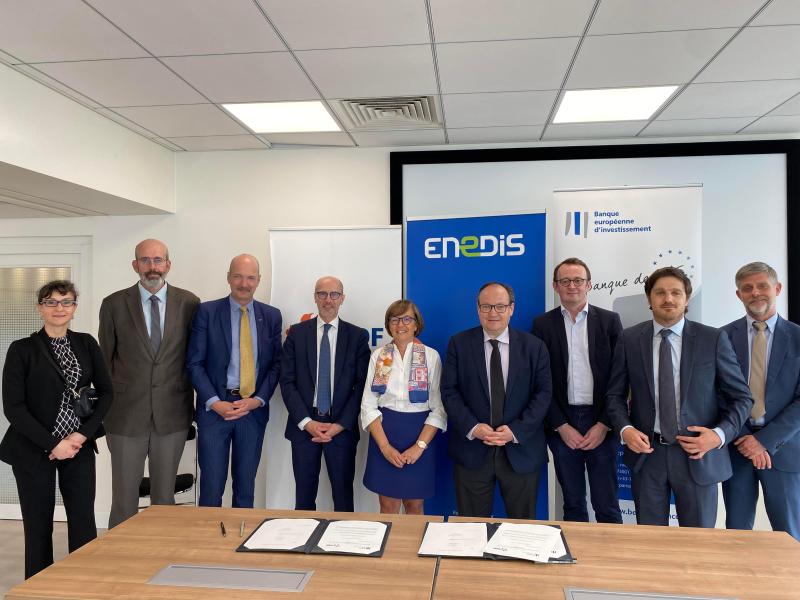
EDF and the EIB have announced the signing of an €800 million loan contract to partly finance the investments of Enedis, an independently managed power grid operator, for the connection of decentralised renewable energy production facilities and electric vehicle charging stations in metropolitan France over the period 2022-2024.
In 2050, electricity is expected to account for 55% of final energy consumption in France. In this context, the green transition is a major challenge in the regions of France as it will be accompanied by strong growth in the development of renewable energy and electric vehicle production in the coming years. Enedis, the public service company that manages the power distribution network in 95% of France, is poised to play a key role, particularly to connect renewable energy production facilities and charging stations in the country.
In order to support this acceleration of the green transition in the regions, EDF, in its capacity as a shareholder of Enedis, has taken out an €800 million loan with the European Investment Bank on behalf of Enedis. This will partly finance more than 11 465 km of new distribution lines and associated power transformation equipment costing €1 672 million in total. This loan accounts for 50% of these investments over the period 2022-2024.
Almost 90% of wind and photovoltaic energy produced in France is integrated into the distribution network managed by Enedis. France had more than 540 000 renewable energy producers at the end of 2021, of whom around a third were self-consumers. In 2015, there were only 3 000, which shows the exponential growth in the pace of connection. This rate is set to continue under the National Low-Carbon Strategy. In 2028, France will thus have between one and two million photovoltaic systems installed.
Today, more than 50 000 public charging stations are connected to the Enedis-managed grid and nearly 100 parking areas are equipped with high-power terminals. Enedis installs charging stations in joint ownership properties and along roads and motorways, and aims to have installed charging stations in 80% of all joint ownership properties in France by 2030 (100% in 2035).
The EIB, which is a long-standing financial partner of EDF, supports innovative, high-potential projects that contribute towards EU policy goals, including the priorities of combating global warming and the European Green Deal, which aims to reduce net greenhouse gas emissions by at least 55% by 2030 compared to 1990 levels and to achieve carbon neutrality by 2050. Carbon neutrality will require large-scale electrification of uses, such as the deployment of vehicle charging infrastructure and the connection of renewable energy production facilities — developments that lie at the heart of Enedis’s future investments and the financing provided by the EU climate bank to support these investments.
EIB Vice-President Ambroise Fayolle said: “By connecting to its network decentralised renewable energy facilities producing decarbonised electricity and electric vehicle charging stations accelerating the decarbonisation of transport, these Enedis investments will contribute to a profound renewal of France’s energy distribution infrastructure and to the promotion of new automotive habits. Financing these new distribution network uses linked to the energy transition is central to the low-carbon strategy adopted by the EU climate bank, whose investment choices are guided above all by the priority of combating global warming.”
Xavier Girre, EDF Group Executive Director responsible for the Finance Division, said: “Enedis efficiently pursues its public service remit contributing to the penetration of electric mobility in France’s regions and the integration of the increasing volume of renewable energy into the power distribution network. I am pleased to sign a new financing contract today with the EIB to support the modernisation of this network and the acceleration of the green transition throughout France’s regions.”
Background information
About the European Investment Bank
Since 2019, it has been accelerating its transformation into the EU climate bank with a commitment to devote at least 50% of its financing from 2025 to investments that help combat and mitigate the impact of climate change. In 2021, the EIB already comfortably achieved this target in France, where more than one-third of its €9.2 billion in investment (€3.6 billion) went towards innovation projects, most of which had very close ties with climate action.
About EDF
A major player in the energy transition, the EDF Group is an integrated energy company active in all sectors: production, transmission, distribution, trading, energy sales and energy services. As a leader in low-carbon energy worldwide, the Group has developed a diversified production mix based primarily on nuclear and renewable energy (including hydropower) and invests in new technologies to support the energy transition. EDF’s very purpose is to build a CO2-neutral energy future that reconciles the preservation of the planet, well-being and development thanks to electricity and innovative solutions and services. The Group participates in the supply of energy and services to approximately 38.5 million customers (1), including 29.3 million in France (2). In 2021, it generated a consolidated turnover of €84.5 billion. EDF is a listed company on the Paris Stock Exchange.
(1) Since 2018, customers are billed by delivery location; a customer can have two delivery points: one for electricity and another for gas.
(2) Including ÉS (Électricité de Strasbourg) and SEI.

